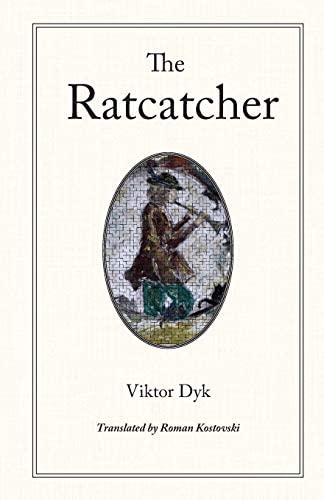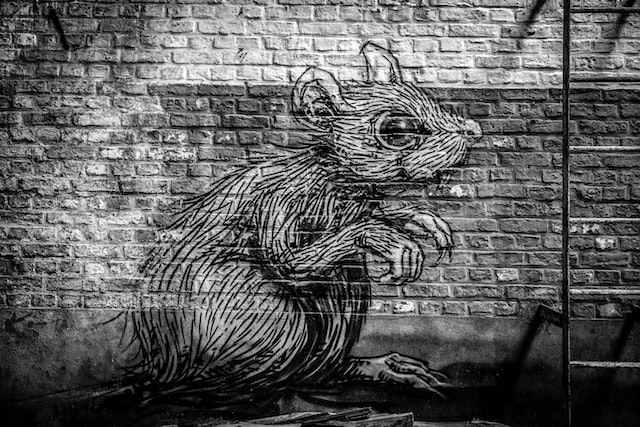by Nicole Yurcaba

Czech nationalist poet, prose writer, political writer, and politician Viktor Dyk opposed the Austro-Hungarian empire, and, in 1916-17, for his opposition, went to jail. However, being a writer active in Czech politics was only part of Viktor Dyk’s legacy. Dyk was one of the signatories to the Manifesto of Czech writers, and eventually he founded a political party, the Czechoslovak National Democratic Party. Also among Dyk’s accomplishments is a slender, modernist, lyrical take on the Pied Piper story–The Ratcatcher.
Published by Plamen Press and translated by Roman Kostovski, The Ratcatcher tells the story of Hamelin, a Saxon town, in which a stranger appears. The stranger carries a magical fife, and he promises to rid the town of rats for 100 Rhine Ducats. The stranger becomes known as The Ratcatcher, and he fulfills his promise to rid the town of its vermin by playing his fife and leading the rats to the river. However, as The Ratcatcher goes about his duties, life for him in Hamelin becomes increasingly difficult, and a series of unfortunate, even supernatural, events leave The Ratcatcher wondering who the true vermin are in Hamelin.
However, Plamen Press’s edition of The Ratcatcher isn’t just another everyday retelling of an age-old fairy tale. Dyk’s version is smart, intelligent, and philosophical. The Ratcatcher is truly an outsider, a person with a talent and unique skill who finds himself in a town where the townspeople’s values, traditions, and mentalities aren’t exactly welcoming to newcomers. Because of this, The Ratcatcher initially reads like a classic human-versus-society story, but when considering Dyk’s own political involvement and views, one might recognize a few revolutionary undertones, especially if readers consider Dyk’s opposition to German ideas and his suggestion that Moravia and Bohemia secede from the Austro-Hungarian Empire. The Ratcatcher, like Dyk himself, was a lone wolf, a man with a unique plan that might have worked had the circumstances and cooperation existed.
The Ratcatcher also bears a hint of Transcendentalism. While Hamelin’s accepted civilians live within the town’s boundaries, the outcasts like The Ratcatcher and the elusive Jorgen return to the forests and the river surrounding Hamelin. This portrayal is a classic one, reminiscent of American Puritan literature in which a town’s boundaries were regarded as the “good realm” and nature and the wilderness were regarded as the “evil realm.” Nonetheless, nature actually becomes a redeeming space, a space where The Ratcatcher returns to his soul’s and his self’s essence. One of the most beautiful passages occurs in the surreal, dream-like portrayal of The Ratcatcher’s experience at the mountain: “On the mountaintop where the Ratcatcher stood, one could see the entire region, an uninhabited and yet promising land. And on the mountaintop where he stood, the Ratcatcher felt how wonderful it is to be alive.” At this point, The Ratcatcher reconnects with Jorgen, and even though the two connect via their ostracization from society, they remain separate individuals philosophically. Other passages offer Thoreau-like, philosophical snippets prodding readers to turn to nature when they feel a loss of self: “And if you are tired by the day, if the sun is too cruel or the road too dusty, behold how patiently the waters of the river await you.” In these lines a simple poesy resides, one not even present in such classics as A River Runs Through It.
The Ratcatcher also bears another interesting twist–a character named Master Regent Faustus. The book’s portrayal is true to form: Master Regent Faustus is a terrifying, mysterious figure. His supernaturality emerges when he confesses to The Ratcatcher, “‘In Wittenberg they say that I sold my soul to the devil. Don’t believe it. First of all, there is no such thing as a soul.” With this admission, Faustus becomes The Ratcatcher’s antithesis, and his eerie presence adds to the subtle psychological horrors and twists present in the book.
Threaded into the brief, yet complex, plotline is the blossoming love between Agnes and The Ratcatcher. Their love story is quiet, beautiful, and heartbreaking. With Agnes, the life and revival of self The Ratcatcher experiences parallels his rejuvenation in nature. However, the outcome of their relationship is a warning about what happens when two disparate worlds collide.
Plamen Press’s edition of The Ratcatcher is the first-ever English translation of the book. It’s a book filled with warnings, anecdotes, and psychological twists. Despite its historical setting, it’s a book with a message that may very well be as important now as it was then.
Nicole Yurcaba (Ukrainian: Нікола Юрцаба–Nikola Yurtsaba) is a Ukrainian (Hutsul/Lemko) American poet and essayist. Her poems and essays have appeared in The Atlanta Review, The Lindenwood Review, Whiskey Island, Raven Chronicles, West Trade Review, Appalachian Heritage, North of Oxford, and many other online and print journals. Nicole teaches poetry workshops for Southern New Hampshire University and is a guest book reviewer for Sage Cigarettes, Tupelo Quarterly, Colorado Review, and The Southern Review of Books.



Add your first comment to this post